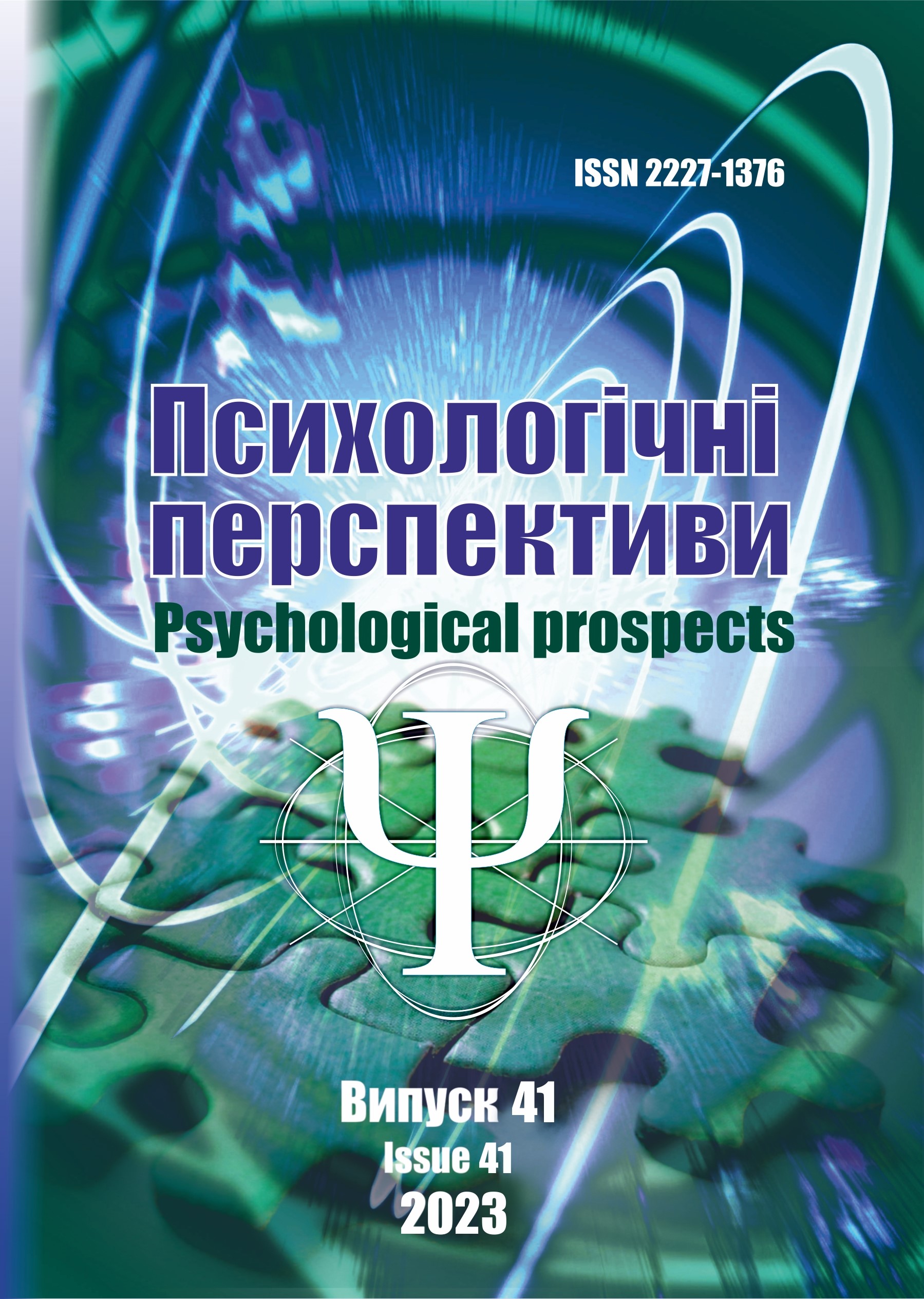Features of the influence of the performance of eurhythmic exercises on the mental state of a person (the results of the experimental research)
DOI:
https://doi.org/10.29038/2227-1376-2023-41-borKeywords:
stabilization of the mental state, stabilization exercises, experiment, techniques for overcoming stress, therapeutic eurythmy, crisis assistance, war traumaAbstract
Purpose. Based on the analysis of the results of three experimental studies of the effectiveness of the eurythmic exercises, describe the features of their impact on the mental state of a person.
Methods. Experiment; self-assessment of mental states; a modified version of the methodology for assessing mental activation, interest, emotional tone, tension and comfort (according to L. Kurganskyi and T. Nemchyn); frequency analysis; t-Student test for paired samples; t-Student's test for independent samples, focus groups.
Results. The results of numerous foreign studies on the effectiveness of therapeutic eurythmy confirm its positive health-improving effect for patients with some chronic diseases and for healthy people. Foreign scientists have proven that in most cases, therapeutic eurythmy helps to reduce stress and fatigue, increase the quality of life and general well-being of a person. The results obtained by the author of the article in all three conducted experimental studies testify to the positive dynamics of the mental states of the participants of the experimental groups; no cases of deterioration of the mental state after performing eurythmic exercises were found. The results of Experiment 2 were fully reproduced in Experiment 3 (increase in indicators of attentiveness, concentration, calmness, indifference, carelessness, relaxation, reasoning, participants felt more rested). The effect of performing eurythmic exercises in Experiment 3 was more significant - out of 20 scales proposed for self-assessment, positive changes were found in 15 scales after performing eurythmic exercises.
Conclusions. Performing eurythmic exercises in all three experimental studies contributed to the improvement of the mental state of the participants according to many important characteristics; no deterioration of the mental state was detected at all. The obtained results give us the opportunity to consider the conducted experiments successful. Our assumption that performing eurythmic exercises can help improve and stabilize a person's mental state has been confirmed. We consider the continuation of a series of experiments to test the effectiveness of various stabilizing exercises, in particular, eurythmic ones, as prospects for further research.
References
Bondarevych, I., & Boroduljkina, T. (2022). Orghanizacija ta metodychne zabezpechennja doslidzhennja efektyvnosti ghrupovogho onlajn kursu z podolannja stresiv ABSR. [Organization and methodical support of the study of the effectiveness of the group online course on overcoming the stress of ABSR]. Aktualjni problemy ekstremaljnoji ta kryzovoji psykhologhiji : zbirnyk tez Mizhnarodnoji naukovo-praktychnoji konferenciji. (m.Dnipro, 21 ljutogho 2022 r.). 6-10). https://er.dduvs.in.ua/handle/123456789/9538 [in Ukrainian].
Borodulkina, T.O. (2022). Likuvalna evrytmiia yak instrument podolannia naslidkiv stresu ta ztsilennia vid travmy pid chas viiny. [Therapeutic eurhythm as a tool for overcoming the consequences of stress and healing from trauma during war]. Teoretychni ta praktychni osnovy sotsialnoi roboty : monohrafiia. Zaporizhzhia : NU «Zaporizka politekhnika». 238-254. [in Ukrainian].
Doslidnycjkyj proekt z efektyvnosti ABSR. [Research project on the effectiveness of ABSR]. (2022). https://www.absr.international/research-ukr [in Ukrainian].
Evoliutsiinyi riad-1. [Evolutionary Row-1]. (2022). https://www.youtube.com/watch?v=4K8_DU6qDDs. [in Ukrainian].
Evrytmija dlja zmicnennja. [Eurythmia for strengthening]. (2022). Rezhym dostupu: https://www.ukr.eurythmy4you.com/courses/62239- [in Ukrainian].
Kolk, van der B. (2023). Tilo vede lik. Yak lyshyty psykhotravmy v mynulomu. [The body heals. How to leave psychological trauma in the past]. Kharkiv: Vivat. [in Ukrainian].
STABILIZATsIIa – Akademichnyi tlumachnyi slovnyk ukrainskoi movy. (b. d.). Akademichnyi tlumachnyi slovnyk ukrainskoi movy. [STABILIZATION – Academic explanatory dictionary of the Ukrainian language]. http://sum.in.ua/s/stabilizacija. [in Ukrainian].
Shcho take STABILIZATsIIa - Slovnyk inshomovnykh sliv Melnychuka - Slovnyky - Slovopediia. (b. d.). U Slovnyky - Slovopediia. [What is STABILIZATION - Melnychuk's dictionary of foreign words]. http://slovopedia.org.ua/42/53409/290354.html. [in Ukrainian].
Khundkhammer, T., Bokovecj, A., Boroduljkina, T., & Bondarevych, I. Doslidzhennja efektyvnosti ghrupovogho onlajn kursu z podolannja stresiv ABSR: pidghotovchyj etap. [Study of the effectiveness of a group online course on coping with stress in the ABSR: preparatory stage]. Psykhologhichna dopomogha osobam ta ghrupam, shho opynylysj v skladnykh zhyttjevykh obstavynakh [zbirnyk tez Vseukrajinsjkogho krughlogho stolu]. (Dnipro, 1 ljutogho 2022 r.). 52-53. https://er.dduvs.in.ua/handle/123456789/9292 [in Ukrainian].
Khundkhammer, T., & Bokovecj, A. (2022a). Lekcija «Shho take evrytmija ta jiji mozhlyvosti pry podolanni stresiv». 14.06.2022. [Lecture "What is eurythmy and its possibilities in overcoming stress"]. https://www.youtube.com/watch?v=iRMXGUFRfzM [in Ukrainian].
Khundkhammer, T., & Bokovecj, A. (2022b). Lekcija «Zastosuvannja evrytmiji v kryzovykh sytuacijakh». [Lecture "Application of eurythmy in crisis situations"]. 28.06.2022. https://www.youtube.com/watch?v=jlgjE7H2CBw [in Ukrainian].
Khundkhammer, T. (2023). Lektsiia «Prosti rukhy, yaki zmitsniuiut vnutrishni syly i daruiut vidchuttia bezpeky. Pryklady, vpravy, obhovorennia». [Lecture "Simple movements that strengthen internal forces and give a sense of security. Examples, exercises, discussion"]. 22.05.2023. https://www.youtube.com/watch?v=KdM9X-7rNFc&t=27s [in Ukrainian].
Hamre, H.J., Witt, C.M., & Glockmann, A. et al. (2007). Eurythmy therapy in chronic disease: a four-year prospective cohort study. BMC Public Health. 7, 61. https://doi.org/10.1186/1471-2458-7-61 DOI: https://doi.org/10.1186/1471-2458-7-61
Levine, P. A. (2008). Healing Trauma: A Pioneering Program for Restoring the Wisdom of Your Body. Boulder, Colorado: Sounds True.
Oei, S.L., Thronicke, A., Matthes, H., & Schad, F. (2021). Assessment of integrative non-pharmacological interventions and quality of life in breast cancer patients using real-world data. Breast Cancer. 28(3), 608-617. https://doi.org/10.1007/s12282-020-01193-x DOI: https://doi.org/10.1007/s12282-020-01193-x
Steiner, R. (1990). Eurythmie als sichtbare Sprache. Dornach : Rudolf Steiner Verlag.
Steiner, R. (2003). Heileurythmie. Dornach : Rudolf Steiner Verlag.
Downloads
Published
Issue
Section
License
Copyright (c) 2023 Borodulkina T.

This work is licensed under a Creative Commons Attribution-NonCommercial 4.0 International License.






